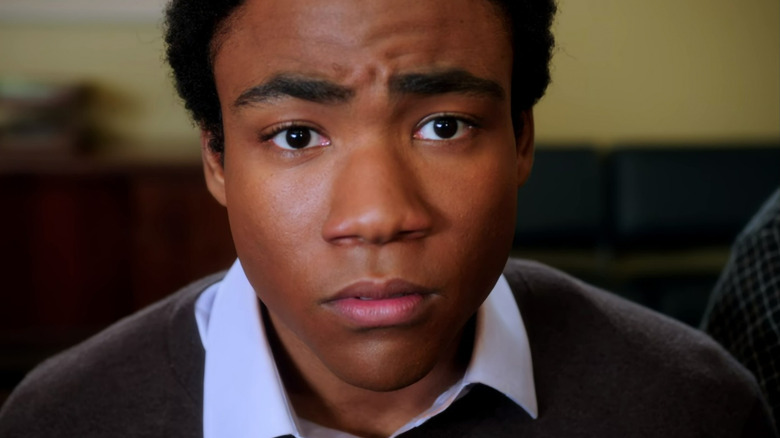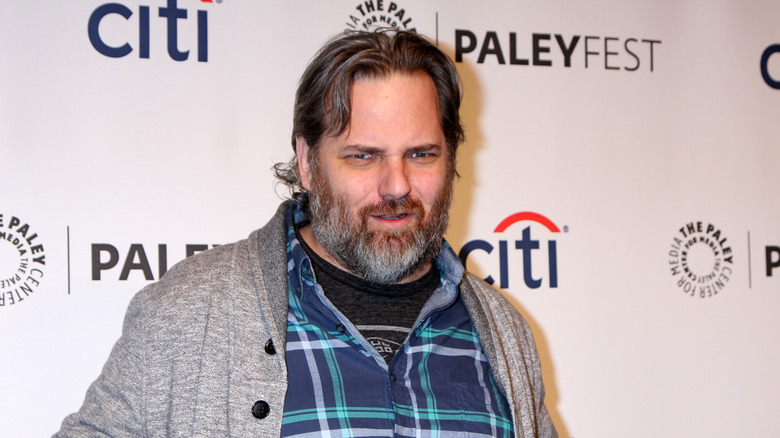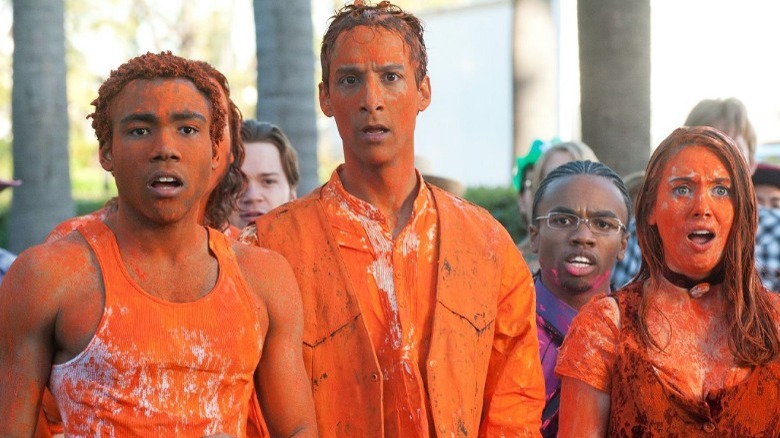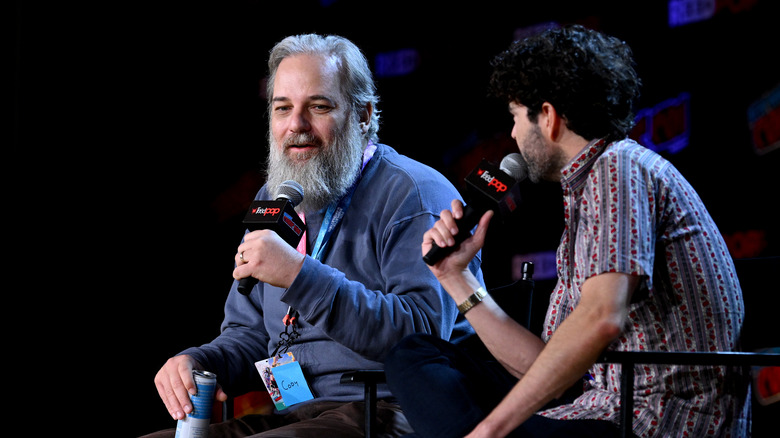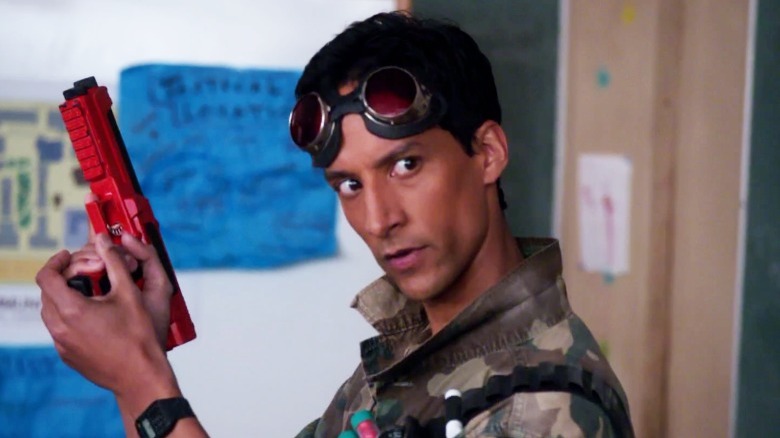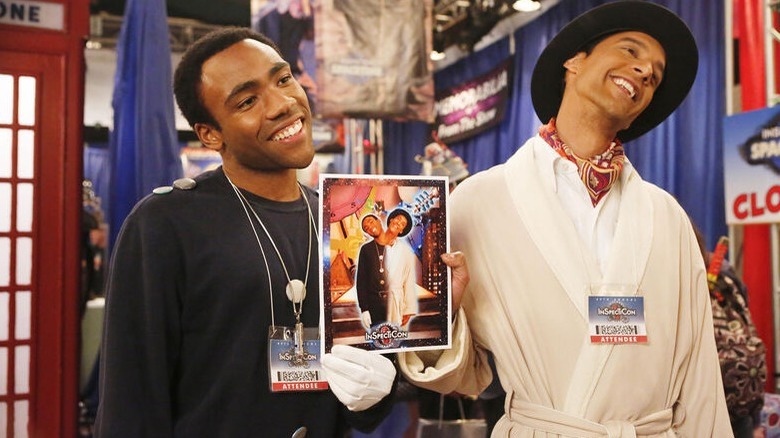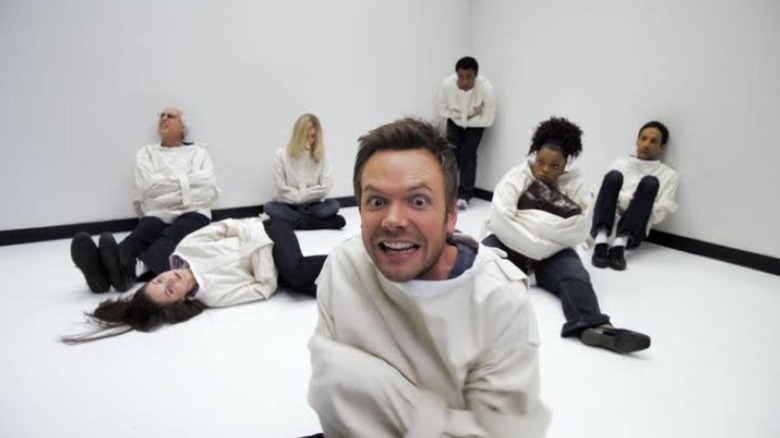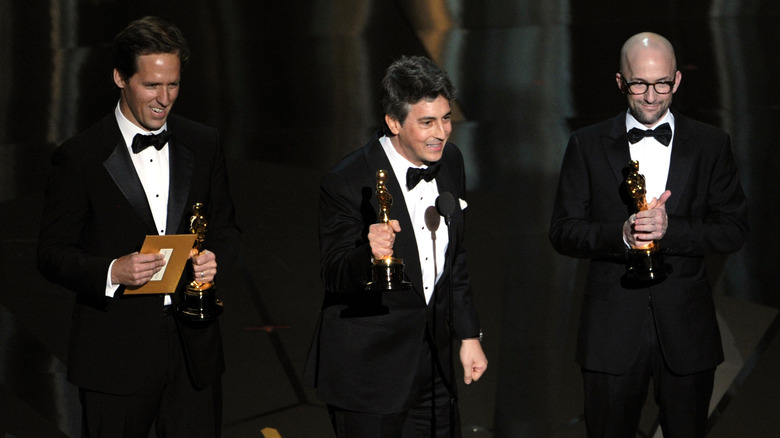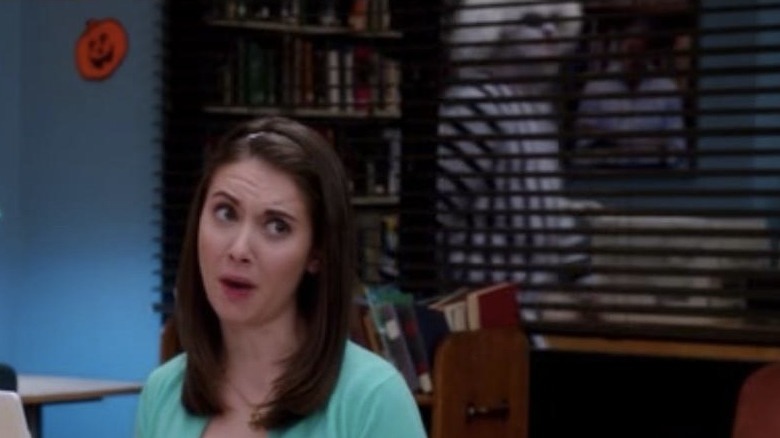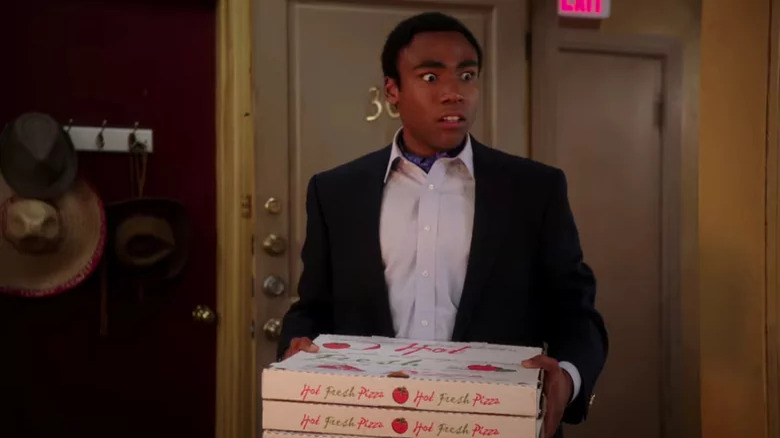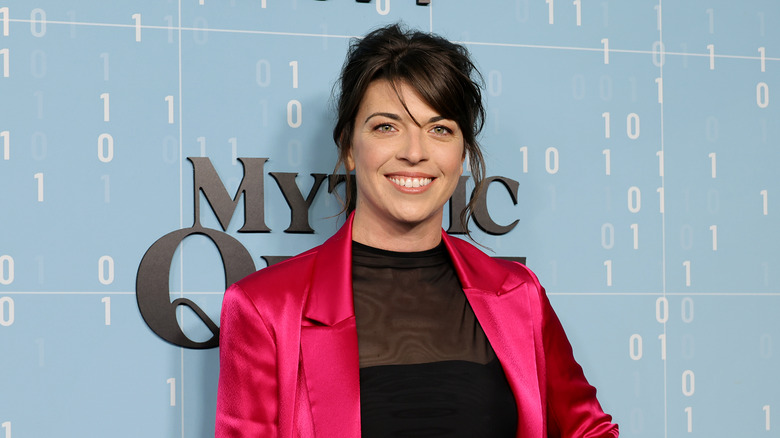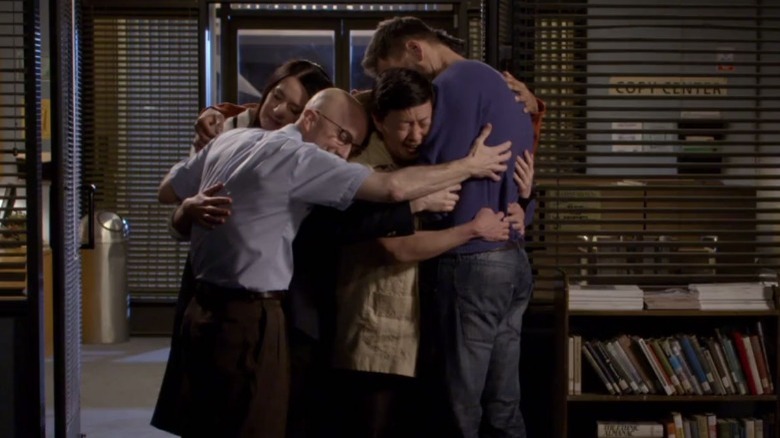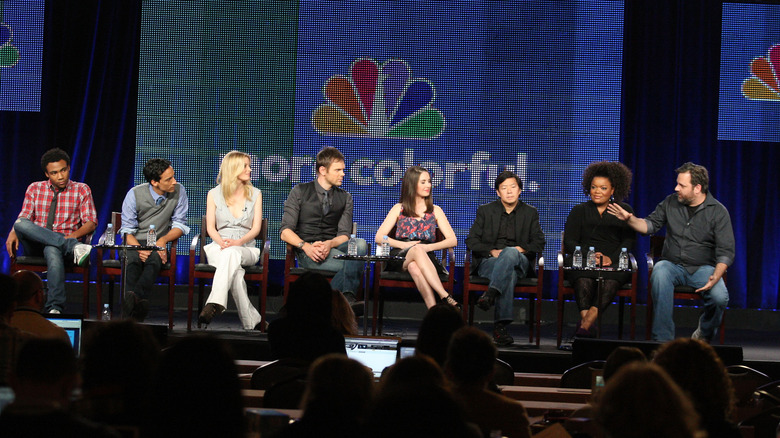Community Facts To Prepare Greendale Students For The Upcoming Movie
Are we really getting a "Community" movie? Yes indeed: Years after its 2015 cancelation, this lovable underdog of a sitcom from the mind of Dan Harmon will actually complete its "Six seasons and a movie!" rallying cry. This is the rare bit of information that gives you hope we're in the prime timeline, rather than the darkest. What begins as just a quick and quippy sitcom about a community college study group evolves into a cult-hit comedy that parodies other genres, creates genuine depth between its characters, and delivers more jokes per minute than almost any other show.
Other sitcoms might boast a similar degree of joke density, cast cohesion, or sharpness of wit. But no show has ever matched "Community" in inventiveness and all-out commitment to wildly different premises, every single week. The best episodes of "Community" are nothing like one another: They encompass action movie-level paintball fights, spot-on "Goodfellas" homages, fake clip shows, stop-motion animated Christmas tributes, and much, much more. Then, when the narrative complexity and self-referential meta-humor threaten to overwhelm your suspension of disbelief, "Community" blindsides you with unexpected pathos. In addition to some of the best writing on broadcast television, it has a talented cast with believable chemistry. Are you a Greendale Human Being riding high on nostalgia and disbelief in the wake of the movie's announcement? We've got you. Here are some fun "Community" facts to tide you over until the movie debuts.
It's based on Dan Harmon's real community college experience
When we're cast out into the world of adulthood, a part of us begins to yearn for the feelings of safety and belonging we enjoyed with our families. "Community" captures this elusive emotional mixture by focusing on a diverse group of misfits, weirdos, and outcasts who are hoping to reinvent themselves (or recover from their various setbacks) at Greendale Community College. Sure, it might be a comically shabby institution that gets 80% of its electricity from an apartment building across the street. But all of the swipes at life in a community college are from a genuine place of nostalgia: "Community" is based on creator Dan Harmon's real experiences of being charmed by a community college study group, even though he initially felt he was above such proceedings.
Speaking to The Independent, Harmon revealed he was basically Jeff Winger at this point in his life, having centered his identity around being a beleaguered writer whose talents were going unnoticed. But during a study group session, he realized he was personally invested in how these relative strangers were going to fare in their classes. In that moment, "Community" was born. "I had this warm feeling come over me," Harmon noted. "The two thoughts I had were: I've been really distorted in my view of the universe and this is the kind of pilot networks are always wishing I would write."
It was as exhausting to make as it looks
Most sitcoms consist of people sitting around and chatting. The titular buddies of "Friends" rarely do much more than hang out at Central Perk, while "Seinfeld" wears its "show about nothing" ethos on its sleeve. "Community," in tremendous contrast, is about everything. In any given episode, it could take a deeply personal dive into one of the characters' mental landscapes, pull off a genre-defying romp that turns students into zombies (and eventually wipes everyone's memory), or indulge in a bottle episode about finding a pen that may as well be an award-winning play.
This results in groundbreaking television. But such structural inventiveness, paired with dense and complicated dialogue, often led to long and grueling shooting days. The majority of the cast expressed as much in The Independent's 2020 oral history of the show. Gillian Jacobs remarked, "It definitely felt like part of the 'Community' experience was exhaustion." Joel McHale was more blunt: "The hours were insane. We were basically shooting a movie every week." Thankfully, this intense experience bound the "Community" cast together. As Yvette Nicole Brown put it, "We could commiserate with each other, laugh, joke and take naps with each other — and we did all those things ... Our whole life was that show."
Dan Harmon's story circle has inspired a generation of writers
The brilliance of "Community" is that it's somehow both an ideal sitcom where nearly every line functions as a joke and a purveyor of exhaustively complete stories told in the span of 22 minutes. This success comes, in part, from a storytelling method that Dan Harmon adapted from the archetypal "hero's journey" outlined by author Joseph Campbell. This Story Circle — or "Dan Harmon's Story Circle," if you're a devotee — is an intriguing creation. Notably, where Campbell focuses on epic myths with supernatural elements in which a lot of big things happen to a relative cipher (think Luke Skywalker or Neo), Harmon focuses his Story Circle on the way characters are motivated into action by their desires, and the consequences that follow.
Harmon's Story Circle has become a crucial element of TV writing culture and a staple of screenwriting blogs. It's often hailed by aspiring writers as an essential tool for clarifying sitcom structure. As with all things related to Dan Harmon, it's even inspired a super-meta parody: A Season 4 "Rick and Morty" episode focuses on a narrative-generating "Story Train," which goes around in an endless circle.
Dan Harmon thinks Abed is key to Community's appeal
Self-awareness is an essential tool in comedy. Stand-up comedians are a great example of this: The very best are able to break the fourth wall and talk to the audience about the venue, the mood of the crowd, or even how their last joke was received. "Community" wasn't performed live, but it is self-consciously about itself in a very similar way. This could easily be insufferable, if it weren't so intensely funny. One of the ways "Community" breaks the sitcom mold is by making jokes at its own expense, and, by extension, the expense of recognizable tropes like bottle episodes and clip shows. Dan Harmon thinks none of this would have been possible without putting a likable human face on such self-awareness — specifically, Danny Pudi's face. As Abed Nadir, he is the heart of the show.
As Harmon eloquently told The Independent, "Every primate wants that sense of family and comfort but you're nagged by this very healthy skepticism because TV feels like a lie. Simply having Abed there to say every few moments, 'This sure feels like we're on a TV show' — I always looked at that as making the fourth wall digestible to a millennial audience so they could lower their defenses and fall in love with the show." In other words, by staying mindful of the inherent artificiality of relating to TV characters, "Community" creates an easier path to our hearts. Watching the show alone is like watching it with a friend.
The actor who played Inspector Spacetime made the show real
The friendship that develops between Abed and Troy is absolutely key to the success "Community" has enjoyed. The show often goes to great lengths to parody other media, especially cornerstone genre franchises with decades of nerd devotion to their name. On other series, this might have been mean-spirited. But the infectious enthusiasm Troy and Abed feel for their favorite pop culture is a constant reminder that the show is coming from a loving place, not a mocking one. One especially superb recurring element is their love of "Inspector Spacetime," an obvious parody of the BBC's long-running "Doctor Who" franchise.
Believe it or not, the actor who plays the titular Inspector, Travis Richey, transformed it from a running gag into a real show, by making his own low-budget "Inspector Spacetime" webseries on YouTube. The saga is titled "Untitled Web Series about a Space Traveler Who Can Also Travel Through Time" for legal reasons, as Richey got a cease-and-desist letter from NBC (via EW.com). In true "Community" spirit, it exists as a parody of a parody, with unbridled enthusiasm to spare.
Community survived by making fun of itself
After putting out a rough Season 4 that prompted some fans to give up on the series, "Community" recovered in Seasons 5 and 6 through an utterly ruthless commitment to roasting its own mistakes. This is a trickier thing to pull off than you might guess. The outright strangeness of Season 4, which was created under different showrunners, had to be addressed for the show to evolve, but said address had to cohere with what came before. Thus, multiple characters make tongue-in-cheek references to the "gas leak year," even as the show sticks to the narrative choice of having Jeff graduate from Greendale.
In the Season 5 premiere, Jeff basically speaks for Dan Harmon, who was reinstated as showrunner after his Season 4 absence. "Oh, don't blame it all on a gas leak year," Jeff says. "This was a four-year process. We went in one end as real people and out the other end as mixed-up cartoons." Indeed, after a strange and nearly ruinous year, "Community" gets back to itself — not by being a perfect show, but by being a show that knows exactly how to point out its own shortcomings in a charming way.
Dean Pelton won an Oscar
No "Community" fact is more fun than this: Jim Rash, the actor and writer who takes the role of Dean Craig Pelton and runs away with nearly every scene he's in, won an Oscar for Best Adapted Screenplay for "The Descendants." This happened while "Community" was still on the air. It's just delightful to imagine him going to Oscar parties on Sunday night, then waking up the next day to go to work on "Community" in one of the dean's trademark ridiculous outfits.
In addition to acting, Jim Rash and his writing partner Nat Faxon have also written (and co-directed) the comedies "The Way, Way Back" and "Downhill." And, although "The Descendants" director Alexander Payne gave the speech at the Oscars ceremony, Jim Rash brought a little Dean Pelton spirit to the proceedings by striking a pose in a spot-on imitation of Angeline Jolie. This was one of the funniest moments of the typically sedate awards show, which won't come as a surprise to anyone who knows Rash from "Community."
The long-term Beetlejuice gag
"Community" is such a dense show, it was basically made for the internet. Repeated viewings reveal jokes that you almost certainly missed the first time, running gags that last entire seasons, and, in one case, a visual wisecrack that takes three entire seasons to set up. It'd be very easy to miss without superfans and Reddit sleuths piecing it together, but luckily, we live in an age where both are abundant. After working references to "Beetlejuice" into one episode of Season 1 and one episode of Season 2, "Community" Season 3 makes a final mention of the famous undead rascal. True to form, he's summoned into existence by three intonations of his name, and can be seen walking through a window placed behind the study group.
The "Beetlejuice" references actually go from abstract to specific as he gets closer to appearing. In Season 1's "Communication Studies," Professor Slater mocks Britta's name, saying, "What's the blonde's name — Bitter? Butter? Beetlejuice?" In Season 2's "Cooperative Calligraphy," Britta mentions that Jeff normally wears Beetlejuice-esque underwear (by which she means it has stripes). The final exhortation, which comes in Season 3's "Horror Fiction in Seven Spooky Steps," is an outright reference to the "Beetlejuice" soundtrack on a playlist.
Remedial Chaos Theory is one of the best sitcom episodes of all time
Season 3's "Remedial Chaos Theory" has been deemed by Vulture as the greatest sitcom episode ever made. This might seem like an absurdly massive bit of praise, but it's also completely deserved. "Remedial Chaos Theory" is many things at once: It's an exploration of multiverse theory, a concise and moving experiment with the social dynamics of the study group, and a cultural touchstone that provides catharsis through bleak humor. With the simple mechanism of a fateful roll of the dice, "Community" transforms itself into a wildly experimental sketch show, focused entirely upon its own mythology.
The writing process that created this epic episode was apparently as chaotic as the end result: Dan Harmon shared images on his Tumblr of complicated whiteboard diagrams that chart the path of all seven characters in all seven timelines. All in all, "Remedial Chaos Theory" contains 49 distinct character arcs. Small wonder that Harmon says the episode broke the writers, instead of the other way around.
Dan Harmon's apology to Megan Ganz
After the drastic shift in culture propelled by the Me Too movement, many details of troubling on-set behavior came to light. "Community" joined the conversation in 2018 when Megan Ganz, a writer on three seasons of the show, prompted Dan Harmon to specify his misdeeds when he tweeted vaguely about treating a member of his writing staff poorly. Harmon then issued a full and thorough apology on his podcast. He detailed how he made advances toward Ganz during her time on the show, took his feelings out on her when she rejected him, and was aware the whole time that his position as her boss put her in a torturous position.
These events coincide with the moment Harmon was fired by the network. He connects it all in his apology, saying, "I lied to myself the entire time about it. And I lost my job. I ruined my show. I betrayed the audience. I destroyed everything and I damaged her internal compass." Ganz told the New York Times that she thanked Harmon for his candor and forgave him. It's one of the rare stories of the Me Too era that ends with an actual apology, let alone acceptance.
Dan Harmon wasn't ready to make the movie right away
Part of what's made the wait for a "Community" movie so interminable is the anxiety of the unknown. With the cast scattered to the winds, Dan Harmon moving onto an endless supply of "Rick and Morty" episodes, and the years ticking away, it got harder and harder to keep the faith. Now that it's finally happening, it won't be twisting the knife to reveal that if he had wanted to, Harmon could have made a "Community" movie right away. Even though the Yahoo! Screen streaming platform that aired the final season of "Community" died an unceremonious death, Yahoo! was apparently very interested in a movie right off the bat.
As reported by TV Guide, Harmon made this clear at a festival all the way back in 2015. "I told Yahoo, 'I can't think about writing a movie until I miss 'Community,'" Harmon said. "They wanted to turn around and do a movie immediately, and Yahoo can get it done. They're like the NSA." Apparently he didn't miss "Community" enough until another few years had gone by. This plunged fans into a purgatory of hope and speculation — but luckily, it all culminated in a true-blue movie announcement.
How NBC won Dan Harmon back over
As Dan Harmon revealed at a Variety event in November 2022, when it came to a production partner for the "Community" movie, the choice was down to either Amazon or Peacock. It turns out that sincere passion for marketing the project is what made him go with Peacock. This brings "Community" full circle, as NBC was the show's original network. After his firing and the ultimate cancelation of the show, both sides have finally arrived back in the same place.
Harmon's remarks, as brutally honest as ever, imply that he was impressed by Peacock's commitment, even if he's not optimistic about the streaming platform's future. "Is it smart as a creative to go with the place that you think is more solvent?" Harmon queried. "That's not how a creative should think, you're supposed to go with your passion, and ultimately, that is what we did." Obviously, Amazon Prime is the more established, and, yes, solvent streaming giant. But in keeping with its lovable underdog energy, "Community" will place its last bet on one of the pluckier upstarts of the streaming wars.
